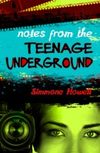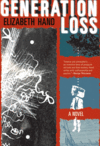So, once again, I find that I have books to talk about and no time to give them separate posts (or even do more than slap-dash off some thoughts). These two lovely, amazing books ended up making an odd, serendipitous pairing though, and I’d hate to let them pass into the reading list sidebar without remark.
 Notes from the Teenage Underground by Simmone Howell
Notes from the Teenage Underground by Simmone Howell
Simmone Howell’s debut novel follows Gem (named by her mother for Germaine Greer) over the course of a summer of disintegration and discovery. The disintegration is of her friendship with her friends Lo and Mira (damaged wild child and needy school slut, respectively); the discovery is of her path as an artist and a human being. If that sounds twee or pretentious — well, it’s not.
The trouble starts when the three girls settle on a new "theme" to focus their summer antics on. They choose "underground," taking their inspiration from an art museum field trip. But while Lo and Mira are playing a game, having fun, doing something to differentiate themselves from the "bar codes" at school, Gem sparks to Andy Warhol and experimental filmmaking, spurred on by her mother. Soon, she’s sweet-talked a camera from the fellow video-store clerk she hopes to lose her virginity to, Dodgy, and convinced her friends to make a movie about outrageous women from history. Mira and Lo resent her newfound agency though. One of the great good things about how the Underground theme is handled is Howell’s deft dropping of the relevant pop culture references. Because they’re mostly older references, the book has a classic feel and won’t become dated by them.
Anyone who’s been part of the inevitable fractures that happen in a friendship between three girls, particularly when the glow on the charismatic leader dims and tips the balance of power will recognize the painful process Gem goes through as she changes and her friends resent it. But while Mira and Lo provide interesting distractions, the story is thoroughly that of Gem herself. Oh, and I’d be remiss not to mention her relationship with her mom (and her dad, too); it’s highly enjoyable to read a young adult novel where adults can be both daggy and cool at once, in the way that adults often are, and where the mother and the daughter so convincingly love each other (and fight with each other too). (I heart Gem’s mom.)
But, really, this is a love letter to young artists — if you are one, or you were one, or you know one, I hope you’ll check it out.
 Generation Loss by Elizabeth Hand
Generation Loss by Elizabeth Hand
This book is a knock-out. If Howell’s book is about the redemptive power of art, then Hand’s is an exploration of its destructive side. Cassandra Neary, aka "Scary Neary," made a splash taking photos of dead kids in alleys and the early NYC punk scene. After being brutalized in an alley herself, she starts a decades-long downward slide into drug use not so much recreational as escapist. She characterizes herself as too lazy to muster the dedication of an addict.
When an old friend tells her one of her own photographer idols, a more famous has-been named Aphrodite Kamestos living as a recluse on a remote island off the Maine coast, has asked for her to come out to do an interview for Mojo magazine, she agrees because she can’t help herself. It turns out that Kamestos’ work had a profound influence on Cass, and that she’s always been curious about how the other woman did it. There’s also the fact that Cass still desperately needs validation that her work meant something, that she ever had the eye. When she gets to Maine though, it turns out Kamestos is even weirder than expected … and not expecting Cass. Add a missing girl and the remnants of a failed commune and things get very, very interesting.
My god, this is an amazing book. There’s a dark sense of dread, a reflection of Cass’s own inner damage, that pervades the entire book. The narrative feels more observed than imagined at times, and yet never less than intricately crafted by Hand. The plot doesn’t feel manufactured; one of the book’s tricks is how it manages to be such a page-turner despite Cass’s nearly accidental trajectory. I quite simply could not put it down.
What a fascinating character Cass is, too — she does things that aren’t just unsympathetic, but bad things. She can’t help herself, and it’s impossible to look away because her actions are so compelling. The end of the novel reveals that redemption can be reached through darkness, not just by following the light. And that maybe, someday, Cass will be able to stand a little of that light again anyway. I was willing to settle for her having found her way back to a darkroom.
A week after finishing this book, I find myself half-believing that Aphrodite Kamestos must exist out there in the great wilderness — she and her dogs and her spooky island home are too perfectly conjured to be invention. That’s the great gift of this book. It conjures a whole world, of bleakness, hidden corners, dangerous choices. A seamless gray sky over rough water that I can close my eyes and see.
Please, do read it.
See also:
Colleen Mondor on Notes from the Teenage Underground
Matt Cheney on Generation Loss
Notes is so great!
I think it’s fairly timeless – that I could have read this book ten years ago, and I could re-read it in five years, and it was and is and will still feel contemporary.
(I recently interviewed Simone, so look for that piece next week!)
Absolutely, LW — I would have loved this book in high school. It feels insta-classic to me. Can’t wait for your interview!
Thanks for the heads up about Notes…, especially. Sounds like one for The Maud, who is a young artist.
I am in definite agreement on the Hand book. In many of her previous books she’s done some of the same kinds of things that she has in GL, and sometimes the bits have worked, sometimes not. This time, _everything_ works, and the result is dramatically more than the sum of its parts.
I haven’t read the other, but will add it to the list.
How old is she? This is definitely mid to upper YA — there’s drinking, drugs and some fairly adult content.
I loved, loved, loved it though.
…one of the book’s tricks is how it manages to be such a page-turner despite Cass’s nearly accidental trajectory.
What an absolutely perfect description. It’s one of the things that makes Cass such a fascinating character and the world she inhabits so real.
I’ll have to look up Notes from the Teenage Underground—that’s a great title.
As for Generation Loss — I find Cass both scary and fascinating. Liz has said that Cass is an exploration of her own possible trajectory if someone had “cut her brakes” at about the age of 21.
I don’t know that I’d like to meet Cass (and I definitely wouldn’t want to meet Aphrodite) but like you, even though she’s horrifying, I couldn’t look away. I loved that she was an unfamiliar character—a woman in her 50s who has lived a weird life and has all the rough edges that go with it.
That’s precisely it, Gavin — she’s so real, but also so new, because we don’t see _her_ or people like her in fiction very often. At least, not in contexts that make them standable for the entirety of a novel. I love the “cut her brakes”; what a great way to sum up what happened to Cass. I also loved that we never got the fetishistic, lingering description of what happened to her… the restraint makes us understand far more how she feels about it.